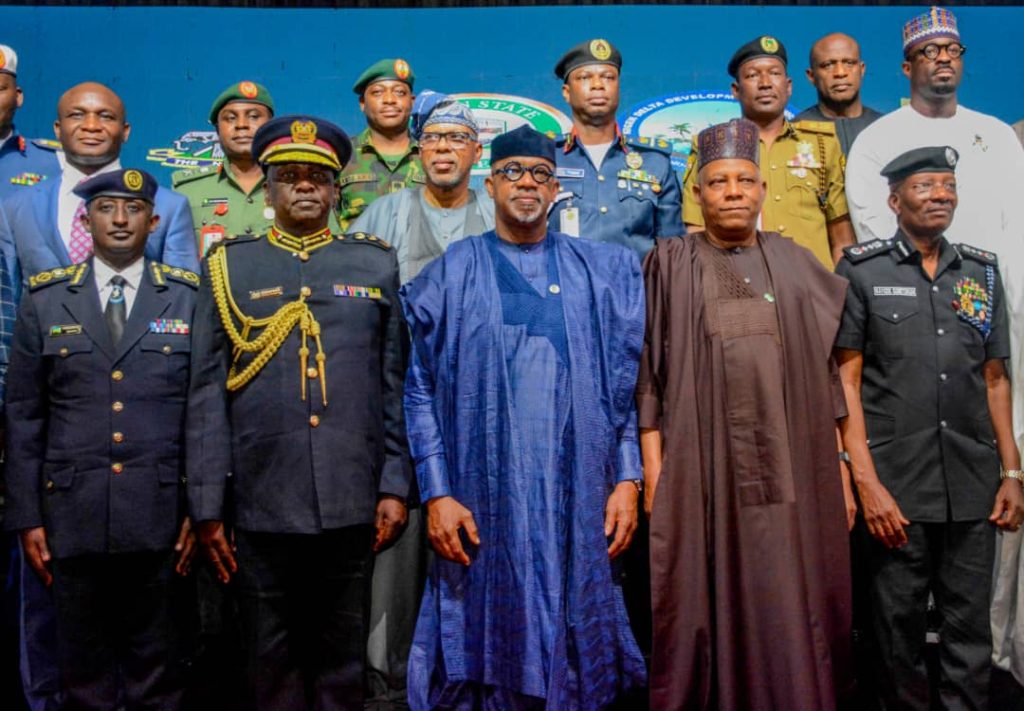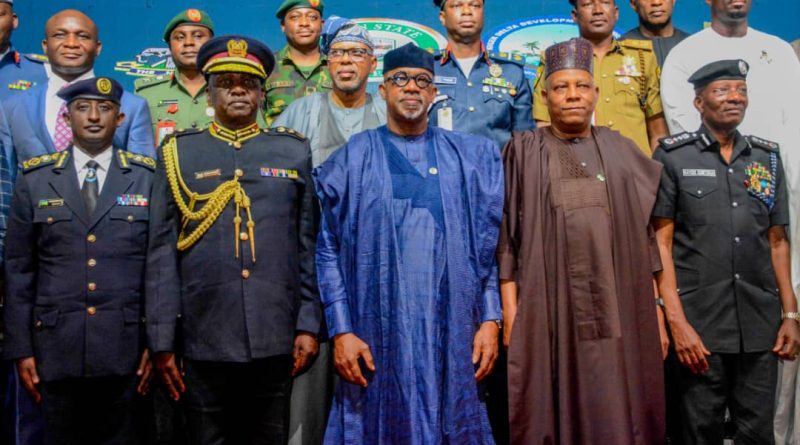We Have Strengthened Security Agencies To Meet Emerging Challenges -Tinubu
President Bola Tinubu has said that his administration has embarked on strengthening the nation’s security apparatus to enable it effectively tackle the emerging security challenges confronting the country.
The President stated this while declaring open the 5th edition of the Conference and Retreat for Senior Police Officers (CARSPO), held at the H3 Event Centre, Oke-Mosan, Abeokuta, Ogun State.
His administration, President Tinubu affirmed, recognizes the importance of security in the socio-economic development of a nation and therefore strengthens its operational capabilities by providing adequate equipment to confront emergencies and effectively combat crime.

The President, who was represented by his Vice, Senator Kashim Shettima, called on the people to actively collaborate with the police to foster a safer society, adding that policing could not succeed without the cooperation of the people.
He said: “While the Nigeria Police Force is constitutionally empowered to maintain internal security, protect lives and property, and uphold public order, it is essential to recognize that security is a shared responsibility; communities and citizens must actively collaborate with the police to foster a safer society.
“No matter how funded, no matter how well equipped, it cannot succeed without the cooperation of the people it serves. Public engagement and trust are central to the process of inclusive policing.”
The President reaffirmed his administration’s commitment to enhancing the institutional capacity of the Nigeria Police Force by ensuring that it is more effective and well-positioned to fulfill its constitutional mandate as the lead agency in internal security.
He said the federal government is working to bridge existing security, infrastructure, and recruitment gaps through a comprehensive and sustainable program, which he said would include renovating police barracks, improving mobility, and upgrading essential combat and protective gear.
The new minimum wage, Tinubu reiterated, is one of several measures by the federal government to enhance the welfare of the Nigerian workforce, including police personnel, adding that his government would continue to collaborate with the police leadership to provide financial incentives to motivate officers and all security personnel to perform at their highest level.
The President maintained that his administration has introduced various reforms aimed at restoring investors’ confidence, stabilizing the microeconomic environment, and reducing inflation.
“We are also taking measures to instill peace, stabilize the foreign exchange market, and eliminate financial leakages by removing fuel and electricity subsidies,” he said.
The President noted that his administration is investing in road and rail infrastructure through Public-Private Partnerships to lower transportation costs, expand market accessibility, boost productivity, and create much-needed jobs.
President Tinubu, while acknowledging that the theme of the Conference, “Improving Nigeria’s Internal Security and Economic Prosperity Through Inclusive Policing,” aligns with his administration’s core objectives, added that he is committed to fostering economic growth by leveraging the vast potential of the country’s human and natural resources.
Also speaking, the Ogun State Governor, Prince Dapo Abiodun, described security as the cornerstone of any thriving environment, adding that a secure society is a place where everyone feels safe and protected.
While adding that inclusive policing is about understanding the unique needs of the people, Governor Abiodun noted that a policing system that actively engages with local communities, upholds human rights, and prioritizes transparency is essential in combating crime and ensuring lasting peace.
The Governor added that security remains a top priority for his administration, and consistently supported the police and other security agencies in the state through strategic partnerships and continuous investment in modern security infrastructure and technology.
Prince Abiodun noted that a major challenge in security management is the lack of public trust.
He said: “We must build a policing system where every Nigerian, regardless of background, believes that law enforcement agents are their friends and that they are there to protect them and not to oppress them.
“Law enforcement officers must uphold the highest standards of professionalism, ethical conduct, and accountability.
“The police force that earns public trust will find citizens willing to provide them with intelligence, report crimes, and actively participate in security efforts.”
The Governor also added that his administration would make available to the police force electric-powered motorcycles, just as some drones capable of facial recognition and number plates up to 8000 meters would also be made available to them.
“As crime becomes more sophisticated, security forces must evolve; they must integrate technology-driven solutions such as surveillance drones for monitoring high-risk vast areas, particularly for timely emergency response.
“We’ve also provided data-driven crime mapping capabilities to predict and prevent criminal activities.
“We should also ensure that we begin to look at artificial intelligence so that this can allow us to ensure that we are proactive.
“Digital forensic tools to track cyber crime and financial fraud are things that must be embraced; all these will allow our law enforcement agencies to stay ahead of criminals and enhance national security,” he said.
Earlier in his remarks, the Inspector General of Police, Kayode Egbetokun, noted that as the country continues to confront complex threats like violent crimes, cyber-related offenses, terrorism, and transnational organized crimes, it is important that intelligence-led policing must remain at the core of its operations.
The IGP also disclosed that the police force is committed to deepening strategic partnerships with both domestic and international security agencies while enhancing community engagement to bolster public trust and promote active citizen participation in policing.
Egbetokun noted that the reorganization of the Force Criminal Investigation Department (FCID) and other specialized units has been a priority, thus ensuring that force detectives operate in line with globally accepted best practices.
He added that all commands and formations have been mandated to implement a comprehensive Action Plan aimed at reducing crime rates by 50% in 2025.




